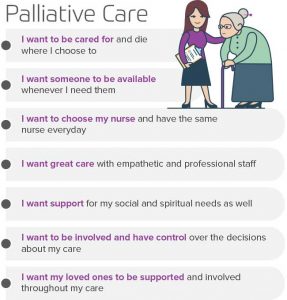The field of palliative care is a vibrant and ever-evolving landscape, offering a wealth of opportunities for nursing research. This guide will equip you with the knowledge and tools to craft a compelling and insightful nursing research paper on palliative care, a topic that profoundly impacts the lives of patients and families facing serious illness.
What is Palliative Care?
Palliative care is a specialized area of healthcare that focuses on providing comfort and support to patients facing serious illnesses. It aims to improve the quality of life for patients and their families, addressing physical, emotional, social, and spiritual needs.
Here’s a breakdown of key aspects of palliative care:
Focus on Relief and Quality of Life:
- Unlike curative care, which aims to treat the disease, palliative care focuses on alleviating symptoms and improving the patient’s overall well-being.
- This includes managing pain, nausea, fatigue, shortness of breath, and other distressing symptoms.
- It also addresses emotional, social, and spiritual concerns, providing counseling, support groups, and spiritual guidance when needed.
Offered Alongside Curative Treatments:
- Palliative care is not limited to end-of-life care. It can be offered alongside curative treatments, such as chemotherapy or radiation therapy.
- This holistic approach allows patients to receive both life-prolonging and comfort-focused care.
Multidisciplinary Team Approach:
- Palliative care teams consist of various healthcare professionals, including:
- Physicians (often specializing in palliative medicine)
- Nurses
- Social workers
- Chaplains
- Pharmacists
- Physical therapists
- Occupational therapists
- Psychologists
Benefits of Palliative Care:
- Improved symptom management and pain relief
- Enhanced quality of life for patients and families
- Reduced anxiety and stress
- Increased patient satisfaction
- Greater preparedness for end-of-life decisions
- Supportive and compassionate care for patients and their loved ones

Who Benefits from Palliative Care?
- Patients with advanced cancer, heart failure, chronic obstructive pulmonary disease (COPD), dementia, and other serious illnesses.
- Patients receiving curative treatment who experience significant side effects or complications.
- Patients and families who wish to receive support and guidance on end-of-life care.
Palliative care is a crucial element of healthcare that provides compassionate support and improves the well-being of patients and families facing serious illnesses. Its focus on holistic care and symptom management helps individuals live their remaining days with dignity and comfort.
How to Write a Research Paper on Palliative Care
- Defining Your Research Focus: A Foundation for Your Nursing Research Paper
Before embarking on your research journey, a clear understanding of your research focus is paramount. The vastness of palliative care necessitates a specific and well-defined scope for your nursing research paper on palliative care.
Consider these questions:
- What aspect of palliative care do you want to explore? Are you interested in patient experiences, symptom management, ethical considerations, or the role of nursing interventions?
- Who is your target population? Will you focus on specific diagnoses, age groups, or cultural backgrounds?
- What specific problem or gap in knowledge are you addressing? Identify a relevant and unanswered question within the realm of palliative care.
For instance, your nursing research paper on palliative care could focus on:
- Evaluating the effectiveness of non-pharmacological interventions for pain management in cancer patients.
- Exploring the impact of spiritual care on the quality of life of terminally ill patients.
- Examining the communication challenges faced by nurses when discussing end-of-life care with patients and families.
- Literature Review: Building the Foundation for Your Nursing Research Paper on Palliative Care
A comprehensive literature review is the cornerstone of a strong nursing research paper on palliative care. It provides a foundation for your research question, demonstrates your understanding of the existing knowledge base, and identifies potential gaps in the literature.

- Start with broad search terms: Utilize keywords like “palliative care,” “nursing,” “symptom management,” “quality of life,” “end-of-life care,” and “patient experience.”
- Refine your search: As you familiarize yourself with the literature, narrow your focus to specific sub-topics within palliative care.
- Critically evaluate sources: Analyze the strengths and limitations of existing research, identifying areas for further investigation. This critical analysis will inform your own research question and contribute to the overall value of your nursing research paper on palliative care.
- Use relevant databases: Explore databases like CINAHL, Nursing Papers, PubMed, and PsycINFO for peer-reviewed journal articles, books, and other credible sources.
- Synthesize your findings: Organize your findings into a logical structure, highlighting key themes, controversies, and unanswered questions. This synthesis will guide the development of your research question and provide context for your study.
- Formulating a Research Question: The Guiding Principle for Your Nursing Research Paper on Palliative Care
A well-crafted research question serves as the guiding principle for your nursing research paper on palliative care. It should be specific, measurable, achievable, relevant, and time-bound (SMART).
Examples of research questions suitable for a nursing research paper on palliative care:
- What is the impact of a standardized communication tool on the quality of end-of-life care for patients with advanced dementia?
- How do nurses perceive their role in facilitating spiritual care for patients in hospice settings?
- Does a tailored music therapy intervention improve symptom management and reduce anxiety in patients with advanced cancer?
- Research Design and Methodology: Choosing the Right Approach for Your Nursing Research Paper on Palliative Care
Selecting the appropriate research design and methodology is crucial for the success of your nursing research paper on palliative care.
Consider these options:
- Quantitative research: This approach uses numerical data to test hypotheses and establish relationships between variables. Examples include randomized controlled trials, observational studies, and surveys.
- Qualitative research: This approach explores complex phenomena and experiences through in-depth interviews, focus groups, or case studies, focusing on subjective perspectives and lived experiences.
- Mixed methods research: This approach combines quantitative and qualitative methods, providing a comprehensive understanding of the research topic.
The chosen methodology should align with your research question and contribute to a valid and reliable nursing research paper on palliative care.
- Data Collection and Analysis: Gathering and Interpreting Information for Your Nursing Research Paper on Palliative Care
The data collection and analysis phase is the heart of your nursing research paper on palliative care. The specific methods used will depend on your chosen research design.
Quantitative data collection:
- Surveys: Gather data from a large sample using structured questionnaires.
- Clinical data: Utilize patient records, medical charts, or databases to collect numerical information on symptom severity, medication use, or other relevant variables.
Qualitative data collection:
- Interviews: Conduct one-on-one conversations with patients, families, or healthcare professionals to gather in-depth perspectives and experiences.
- Focus groups: Facilitate discussions among participants to explore shared experiences and perspectives.
- Observation: Observe and record interactions and behaviors in a natural setting, providing insights into patient-provider communication or the delivery of care.
Data analysis:

- Quantitative analysis: Employ statistical software to analyze numerical data, identify trends, and test hypotheses.
- Qualitative analysis: Use thematic analysis or other techniques to identify patterns, themes, and meanings within qualitative data.
- Ethical Considerations: Ensuring Respect and Integrity in Your Nursing Research Paper on Palliative Care
Ethical considerations are paramount in any research study, particularly those involving vulnerable populations like palliative care patients.
- Informed consent: Obtain informed consent from participants, ensuring they understand the risks and benefits of participating in the research.
- Confidentiality and anonymity: Protect the privacy of participants by ensuring confidentiality and anonymity in data collection and reporting.
- Beneficence and non-maleficence: Ensure that the research benefits participants and does not harm them.
- Justice: Ensure that the research is conducted fairly and equitably, considering the needs and perspectives of all stakeholders.
- Writing the Nursing Research Paper on Palliative Care: Presenting Your Findings and Insights
The final step is crafting a clear, concise, and engaging nursing research paper on palliative care.
Follow these guidelines:
- Introduction: State the research problem, provide background information, and articulate your research question.
- Literature review: Present a comprehensive review of existing literature, highlighting key themes and identifying gaps in knowledge.
- Methodology: Describe your research design, data collection methods, and data analysis techniques.
- Results: Present your findings in a clear and organized manner, using tables, figures, and statistical analyses as appropriate.
- Discussion: Interpret your results in light of existing literature, discuss limitations, and suggest directions for future research.
- Conclusion: Summarize your main findings, reiterate the significance of your research, and offer practical implications for nursing practice.
- References: Include a complete list of all cited sources, following a consistent style guide.
- Publishing Your Nursing Research Paper on Palliative Care: Sharing Your Work with the Wider Community
Publishing your nursing research paper on palliative care allows you to share your findings with the wider research community, contributing to the advancement of palliative care practice.
- Target appropriate journals: Select journals that align with the scope of your research and target audience.
- Follow submission guidelines: Adhere to the journal’s specific formatting, citation, and submission requirements.
- Seek feedback: Share your paper with colleagues or mentors for feedback and suggestions.
- Respond to reviewer comments: Address reviewer comments constructively and revise your paper accordingly.
Examples of Potential Nursing Research Paper Topics on Palliative Care
- Exploring the effectiveness of aromatherapy for symptom management in patients with advanced cancer.
- Evaluating the impact of family-centered care on caregiver burden in patients receiving palliative care at home.
- Investigating the use of technology to improve communication between palliative care teams and patients and families.
- Examining the role of nurses in providing end-of-life care for patients with substance use disorders.
- Assessing the effectiveness of an educational intervention to improve nurses’ knowledge and attitudes towards palliative care.
- Exploring the experiences of nurses providing palliative care to children and their families.
- Investigating the use of art therapy as a coping mechanism for patients with advanced illness.
- Examining the impact of cultural beliefs and practices on end-of-life decision-making in palliative care.
- Evaluating the effectiveness of a palliative care consultation service on patient outcomes and satisfaction.
Writing a nursing research paper on palliative care is a rewarding and challenging undertaking that requires meticulous planning, rigorous methodology, and a deep commitment to improving the lives of patients facing serious illness. By following these guidelines, you can craft a compelling and impactful research paper that contributes to the advancement of palliative care knowledge and practice.
Your research will not only inform and improve nursing care but also empower patients and families to navigate their journeys with dignity, compassion, and support. Remember, your contribution to this vital field of study holds the potential to make a real difference in the lives of those who need it most.
Get Professional Research Paper Writing Help
Are you looking for help with writing a nursing research paper on palliative care? Then, engage the experts at Academia Scholars. We offer professional help with nursing research papers, essays, case studies and dissertations. We guarantee original and compelling papers for academic and career excellence.



 Hi, how can I help?
Hi, how can I help?